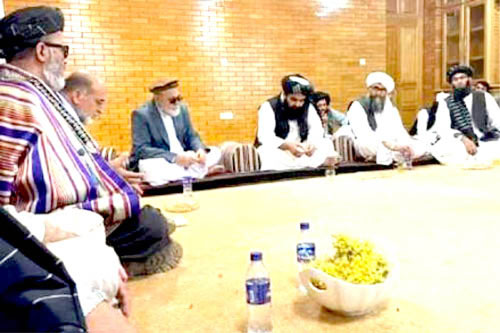Supporters of Ahmad Massoud, the leader of the resistance front against the Taliban, and Taliban representatives held their first meeting on Wednesday afternoon in the center of Parwan province to seek an alternative to fighting.
The resistance front delegation was composed of 12 people led by Almas Zahid, a former Mujahideen commander, and the six-member Taliban delegation was led by Mohammad Mohsin Hashimi, the Taliban’s deputy leader of intelligence.
A representative of the resistance front, Mohammad Alam Ezedyar, wrote on his Facebook page that both sides agreed to not attack each other until the second round of negotiations is held.
The representatives met for three hours and then returned to their respective sides to share the discussed issues with their leaders.
“After three hours of discussion, it was decided that both delegations will share the message with their leadership and resume the negotiations to reach a durable peace in the country. It was also decided that the parties should not attack each other until the second round of negotiations,” wrote Ezedyar.
A member of the Taliban delegation, meanwhile, said that the Taliban wanted to discuss the issue of Panjshir, but Massoud’s supporters wanted to discuss the structure of the future government. Thus the negotiations had no tangible outcome, he said.
“The Panjshir delegation was more focused on the overall structure of the governance system. Since there were big differences between the two sides’ demands, both sides decided to take the messages to their leaders,” said Anamullah Samangani, a member of the cultural commission of the Taliban.
The negotiations followed both sides’ threatening to use military force. “The discussions will bear results in the coming days. If the discussions have no results and they use another option (military), we will do the same,” said Noorullah Noori, a member of the Taliban’s political office.
“We are still waiting for the outcome of the negotiations. Despite this, we have all the military preparations as well,” said Hamid Saifi, a member of the resistance front.
Ahmad Massoud in a recent interview with the BBC said that if an inclusive and acceptable government for all is not established, Afghanistan will be isolated both politically and economically.
“We are negotiating with the Taliban. So far, several countries–like Canada–has said it will not recognize an exclusive government. If that happens the people will continue to suffer,” Massoud said. The Taliban has said they will form an inclusive government, but the terms have still not been clearly defined.—Tolo










